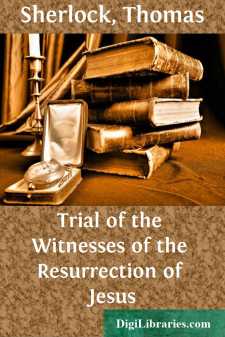Categories
- Antiques & Collectibles 13
- Architecture 36
- Art 48
- Bibles 22
- Biography & Autobiography 813
- Body, Mind & Spirit 142
- Business & Economics 28
- Children's Books 17
- Children's Fiction 14
- Computers 4
- Cooking 94
- Crafts & Hobbies 4
- Drama 346
- Education 46
- Family & Relationships 57
- Fiction 11829
- Games 19
- Gardening 17
- Health & Fitness 34
- History 1377
- House & Home 1
- Humor 147
- Juvenile Fiction 1873
- Juvenile Nonfiction 202
- Language Arts & Disciplines 88
- Law 16
- Literary Collections 686
- Literary Criticism 179
- Mathematics 13
- Medical 41
- Music 40
- Nature 179
- Non-Classifiable 1768
- Performing Arts 7
- Periodicals 1453
- Philosophy 64
- Photography 2
- Poetry 896
- Political Science 203
- Psychology 42
- Reference 154
- Religion 513
- Science 126
- Self-Help 84
- Social Science 81
- Sports & Recreation 34
- Study Aids 3
- Technology & Engineering 59
- Transportation 23
- Travel 463
- True Crime 29
Thomas Sherlock
Thomas Sherlock (1678–1761) was an influential English churchman and writer, known for his theological works. He served as the Bishop of Bangor, Salisbury, and later London, contributing significantly to religious debates of his time. His most famous work is "The Trial of the Witnesses of the Resurrection of Jesus," which defended the authenticity of the resurrection through a legal framework. Sherlock's writings addressed key religious controversies, such as the deism debate, and solidified his reputation as a prominent apologist for Anglican Christianity.
Author's Books:
Sort by:
by:
Thomas Sherlock
THET R I A LOF THEWITNESSESOF THEResurrection of Jesus We were, not long since, some Gentlemen of the inns of court together, each to other so well known, that no man's presence was a confinement to any other, from speaking his mind on any subject that happened to arise in conversation. The meeting was without design, and the discourse, as in like cases, various. Among other things we fell upon...
more...
by:
Thomas Sherlock
The Relation I stand in to you, is a daily Call upon me to consider the spiritual State of these great Cities; and tho' I doubt not but God has many faithful and chosen Servants among you, yet the general View of the Wickedness and Corruption that abound, and are spreading far and wide, gives me, and must give to every serious Christian very painful Reflexions: It is hardly possible to think of...
more...



